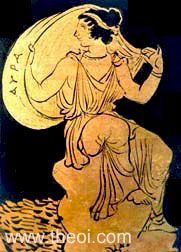AURAI
Greek Name
Αυρα Αυραι
Transliteration
Aura, Aurai
Latin Spelling
Aura, Aurae
Translation
Breeze (aura)

THE AURAI (Aurae) were nymphs of the breezes. They were daughters of either the earth-encircling river Okeanos (Oceanus) or the north-wind Boreas.
In the story of Kephalos (Cephalus) the dawn-goddess Eos was portrayed as a singular Aura. Similarly, the Titan-goddess Aura was a single personification of the breeze.
FAMILY OF THE AURAE
PARENTS
[1] OKEANOS (Homer Odyssey 4.561)
[2] BOREAS (Quintus Smyrnaeus 1.683)
ALTERNATE NAMES
Greek Name
Αεται
Πνοιαι
Transliteration
Aetai
Pnoiai
Latin Spelling
Aetae
Pnoeae
Translation
Breezes, Winds
Breezes
CLASSICAL LITERATURE QUOTES
Homer, Odyssey 4. 561 ff (trans. Shewring) (Greek epic C8th B.C.) :
"The world's end, the Elysian fields . . . [there] for men's refreshment Okeanos (Oceanus) sends out
continually the high-singing breezes of the west (aetai zephyroio)."
Aeschylus, Prometheus Bound 88 ff (trans. Weir Smyth) (Greek tragedy C5th B.C.)
:
"[The Titan Prometheus calls on the spirits of nature to witness his torment :] ‘O you bright sky of
heaven (dios aithêr), you swift-winged breezes (takhypteroi pnoiai) [i.e. the Aurai],
you river-waters (pêgai potamôn), and infinite laughter of the waves of sea
(pontos), O universal mother Earth (panmêtôr gê), and you, all-seeing orb of
the sun (panoptês kyklos hêlios), to you I call! See what I, a god, endure from the
gods.’"
Aeschylus, Prometheus Bound 115 ff :
"[The Okeanides (Oceanids) arrive on the mountain of Prometheus in a winged chariot :] ‘Our group has
come in swift rivalry of wings to this crag as friend to you, having won our father's consent as best we might.
The swift-coursing breezes (aurai) bore me on . . . unsandalled I have hastened in a winged
car.’"
Quintus Smyrnaeus, Fall of Troy 1. 683 ff (trans. Way) (Greek epic C4th A.D.)
:
"[The Breezes bring Ares news of the death of his daughter Penthesilea in the Trojan War :] For the Aurai
(Breezes), Boreas' (the North-Wind's) fleet-winged daughters, bare to him, as through the wide halls of the sky
he strode."
Nonnus, Dionysiaca 37. 70 ff (trans. Rouse) (Greek epic C5th A.D.) :
"The East Wind [Euros] left the rosy chamber of Eos (the Dawn) his mother, and fanned the blazing pure all
night long, stirring up the windfed leaping fire; the wild Aurai (Breezes), neighbours of the sun, shot the
gleams into the air."
Nonnus, Dionysiaca 47. 302 ff :
"[Ariadne is abandoned by Theseus on the island of Naxos :] Boreas (the North Wind) lovelorn himself cared
nothing for the maid stricken with desire--yes, even the Aurai (Breezes) themselves must have had a spite
against the maiden when they carried the ship [of Theseus away] to the Athenian land."
SOURCES
GREEK
- Aeschylus, Prometheus Bound - Greek Tragedy C5th B.C.
- Quintus Smyrnaeus, Fall of Troy - Greek Epic C4th A.D.
- Nonnus, Dionysiaca - Greek Epic C5th A.D.
BIBLIOGRAPHY
A complete bibliography of the translations quoted on this page.